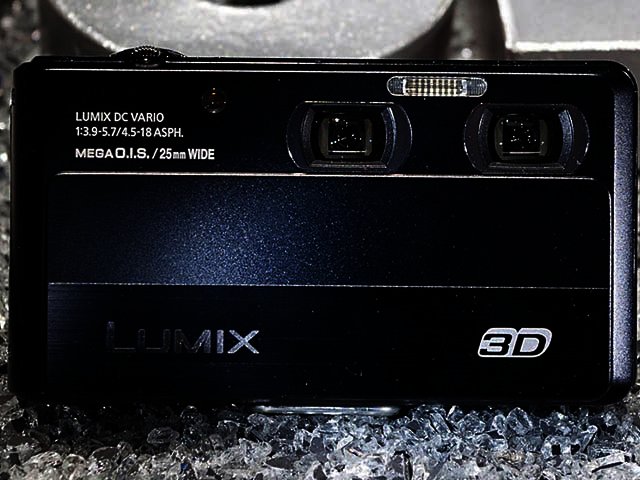PREVIOUS ARTICLENEXT ARTICLE
NEWS

Panasonic announces 3D compact camera
By Ryan Noik 7 November 2011 | Categories: newsPanasonic announced its new LUMIX DMC-3D1 compact camera today, which accommodates the recording of both 3D and 2D video as well as still images. The camera is capable of capturing eight megapixel 3D photos and high definition (1920x1080) 3D video, along with 12 megapixel 2D photos and 1920x1080i 2D videos.
However, it is the simultaneous capture feature of the camera that distinguishes the new LUMIX, which enable users to take 2D images and video at the same time. The company explained that in conventional standard digital compact cameras, users must shoot in either photo or video mode and when photo mode is selected, video recording is interrupted.
Simultaneous shooter
Panasonic elaborated that the twin-lens design of the LUMIX 3D1 breaks through these conventional barriers with two separate mechanisms for image capturing, allowing for dual-shooting capabilities.
Additionally, the two-lens design allows users to record photo or video in different angles of view simultaneously. For example, users can capture an entire party scene with one lens while zooming in on and capturing the photo of a specific person with another lens. Users can also easily switch between 2D and 3D mode with a dedicated 2D/3D switch located on the back of the camera.
“With its twin-lens design, the LUMIX 3D1 can even shoot HD video through one lens and 2D photos from the other – thus getting still and moving content simultaneously, a unique shooting feature which Panasonic provides so users can stretch their creativity,” elaborated Darin Pepple, senior product manager for Imaging at Panasonic.
Further features
The camera also features a large 3.5” touch screen on the camera’s back which allows users to navigate camera functions and recorded photos and videos, along with a shooting speed of 8 frames per second, without auto focusing, and 4 frames per second with auto focusing in full resolution.
An onboard Intelligent Auto mode combines a variety of functions to help users photograph optimal images, including Auto Focus Tracking, Intelligent Scene Selector, Face Recognition and Intelligent ISO Control.
Additionally, the camera offers Intelligent Exposure and Intelligent Handheld Nightshot, which the company explained could be used to generate “beautiful night scenery with illumination by layering multiple images shot consecutively, allowing bright, glamorous night scenery to be recorded without using a tripod”.
However, it is the simultaneous capture feature of the camera that distinguishes the new LUMIX, which enable users to take 2D images and video at the same time. The company explained that in conventional standard digital compact cameras, users must shoot in either photo or video mode and when photo mode is selected, video recording is interrupted.
Simultaneous shooter
Panasonic elaborated that the twin-lens design of the LUMIX 3D1 breaks through these conventional barriers with two separate mechanisms for image capturing, allowing for dual-shooting capabilities.
Additionally, the two-lens design allows users to record photo or video in different angles of view simultaneously. For example, users can capture an entire party scene with one lens while zooming in on and capturing the photo of a specific person with another lens. Users can also easily switch between 2D and 3D mode with a dedicated 2D/3D switch located on the back of the camera.
“With its twin-lens design, the LUMIX 3D1 can even shoot HD video through one lens and 2D photos from the other – thus getting still and moving content simultaneously, a unique shooting feature which Panasonic provides so users can stretch their creativity,” elaborated Darin Pepple, senior product manager for Imaging at Panasonic.
Further features
The camera also features a large 3.5” touch screen on the camera’s back which allows users to navigate camera functions and recorded photos and videos, along with a shooting speed of 8 frames per second, without auto focusing, and 4 frames per second with auto focusing in full resolution.
An onboard Intelligent Auto mode combines a variety of functions to help users photograph optimal images, including Auto Focus Tracking, Intelligent Scene Selector, Face Recognition and Intelligent ISO Control.
Additionally, the camera offers Intelligent Exposure and Intelligent Handheld Nightshot, which the company explained could be used to generate “beautiful night scenery with illumination by layering multiple images shot consecutively, allowing bright, glamorous night scenery to be recorded without using a tripod”.
The LUMIX DMC-3D1 will be available stateside in December 2011 for a $500 (R3944) pricetag, but local availability and pricing has not yet been confirmed.
USER COMMENTS
Most Read Articles
Read

Magazine Online
TechSmart.co.za is South Africa's leading magazine for tech product reviews, tech news, videos, tech specs and gadgets.
Start reading now >
Download latest issue
Have Your Say
What new tech or developments are you most anticipating this year?
New smartphone announcements (46 votes)
Technological breakthroughs (29 votes)
Launch of new consoles, or notebooks (14 votes)
Innovative Artificial Intelligence solutions (29 votes)
Biotechnology or medical advancements (24 votes)
Better business applications (160 votes)



